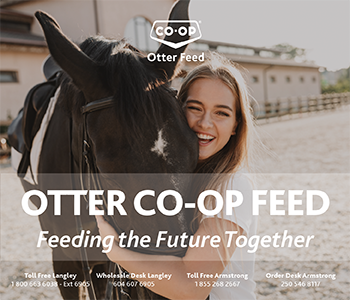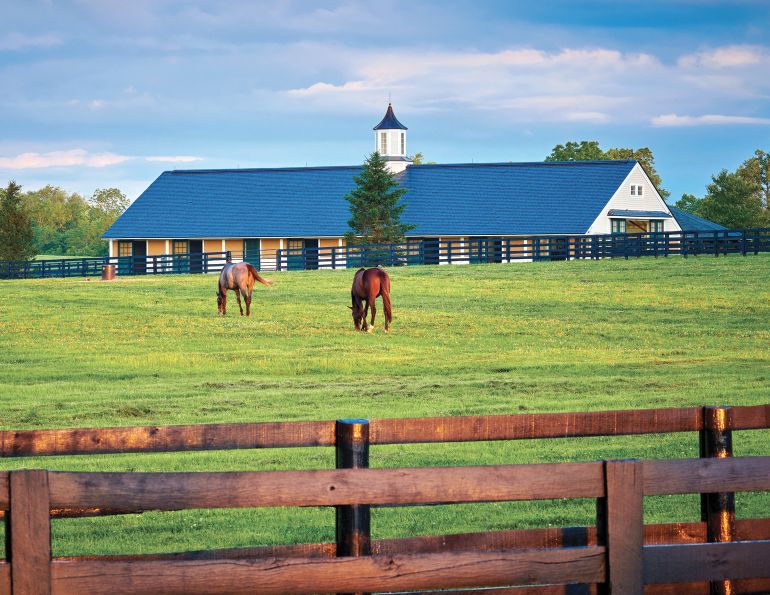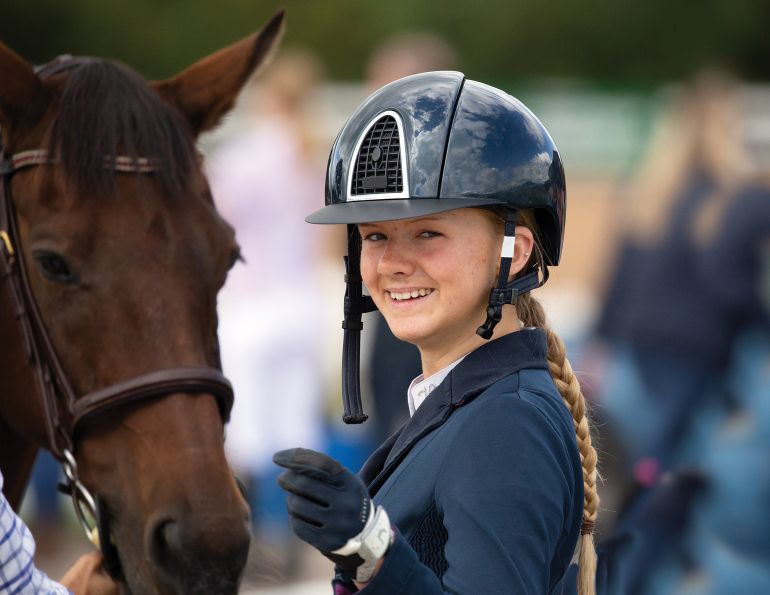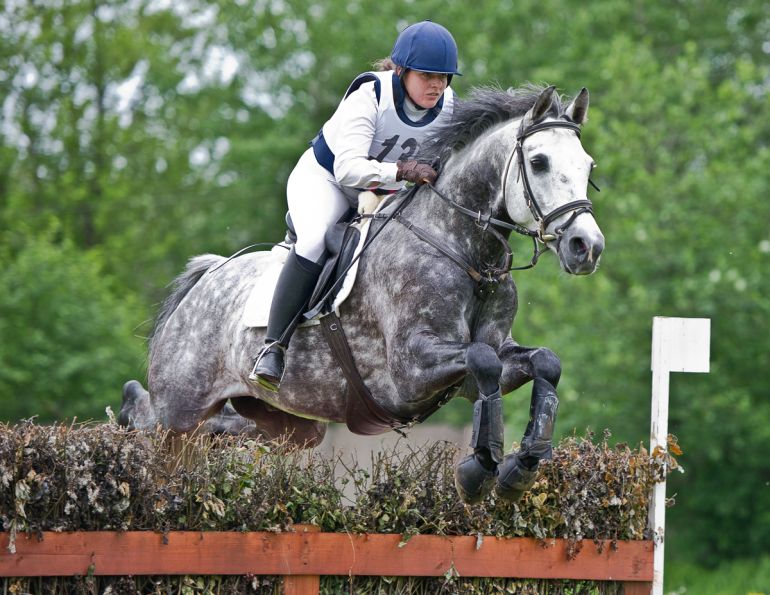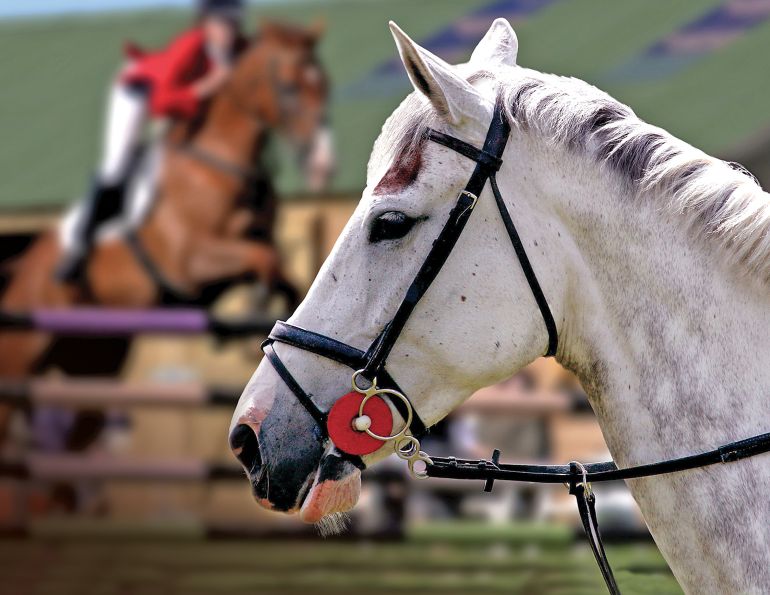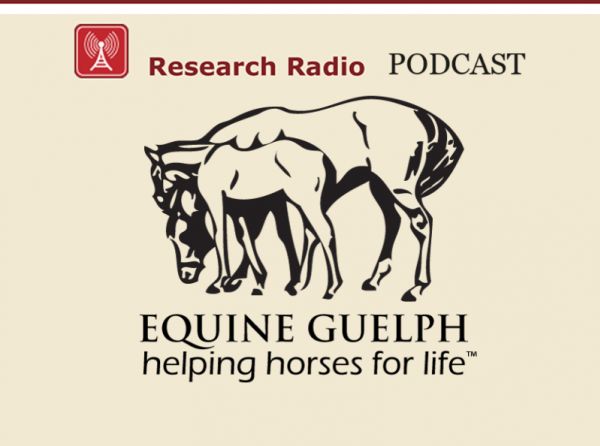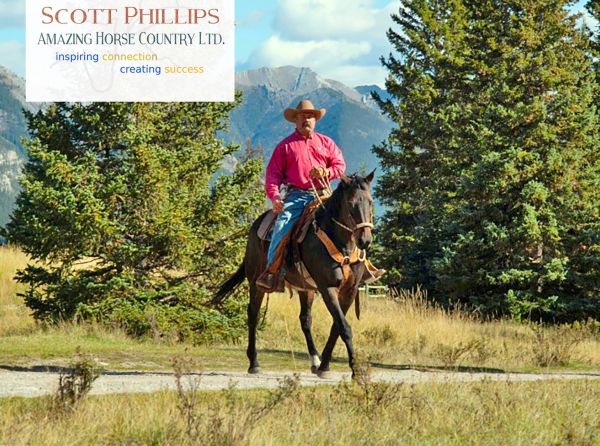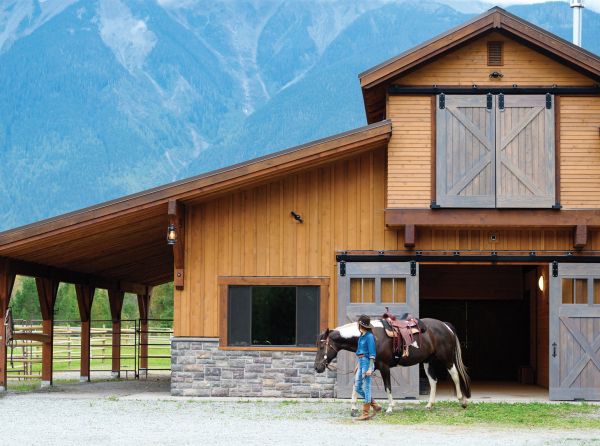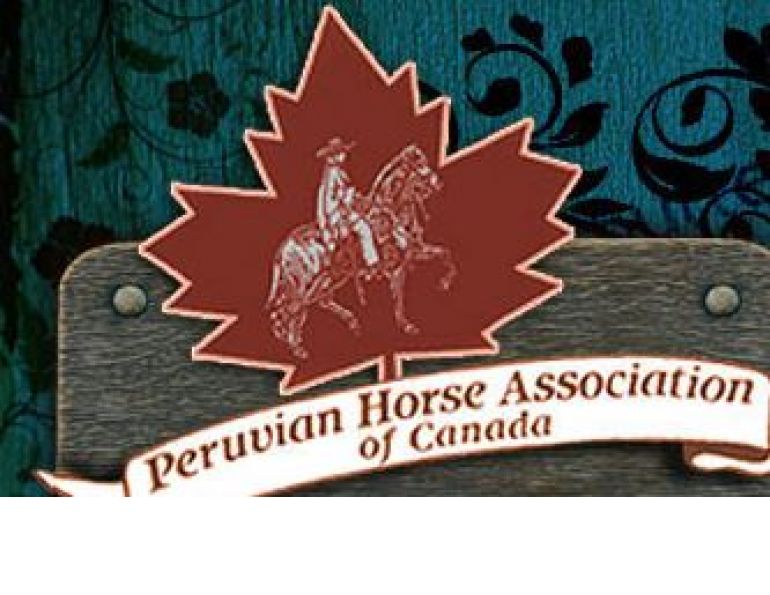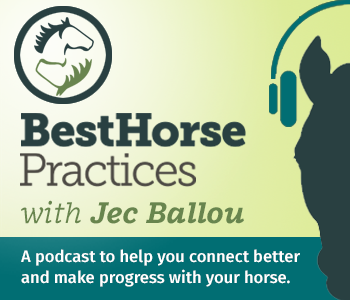By Annika McGivern
If you could choose the way you feel every time you sit on horse, what emotions would you choose? When I ask this question of my clients, their responses usually include the words calm, present, happy, relaxed, and confident. If you agree, it begs the question: Why don’t we feel this way more often in the saddle?
Most equestrians start riding because they love being on a horse. Yet, as they progress in the sport, they experience far more frustration, stress, shame, and sadness than calmness, happiness, relaxation, and confidence. Let’s take a closer look at our emotional experience in the saddle and discuss the steps we can take to develop emotional resilience, which will allow for greater control over thoughts, emotions, and performance in difficult moments.
Imagine the following scenario: You’re riding in a clinic at a new barn with a new clinician. You deeply admire this clinician and really want to make a good impression. Unfortunately, your horse has other ideas. Tense and distracted by the busy and unfamiliar surroundings, he is doing his best giraffe impression and resisting all your attempts at connection and contact. You’re trying to stay calm but you feel everyone’s eyes on you. A flood of embarrassment washes over you. As stress and tension fill your mind and body, you struggle to think clearly.
In my work, I have yet to meet a rider with whom this scenario doesn’t resonate — we’ve all experienced something similar. Imagining this scenario triggers deep, difficult reactions in many equestrians. It makes us feel as if we aren’t good enough and that people are forming negative opinions about our ability. With all the time, energy, money, and passion we throw into our sport, many of us are terrified of not living up to our own expectations of what it means to be a good rider.
I work so hard at this and I’m still not good enough.
I’m wasting everyone’s time.
I want this so badly, but I can’t do it. It’s too hard.
When we have a deep fear of not being good enough, any experience of struggle can trigger a mental storm of fear, frustration, self-criticism, and overwhelm. In the face of this whirlwind of negative emotion, we just want to escape. We mentally check out, drastically reducing our capacity to connect with our horses and solve the problem. As you can imagine, this is not an ideal mental state for performance. Riding at our best requires a calm mind and a relaxed body.
How do we stay calm and relaxed in the face of difficult situations? One answer is to develop and practice emotional resilience.
Related: The Two Faces of Perfectionism in Horse Riding

To manage our emotions, we must first take responsibility for them. Get in touch with yourself and reflect on your frame of mind. Choose the feelings, thoughts, and actions that will help you be your best with your horse. Photo: Shutterstock/Rolf Dannenberg
What is Emotional Resilience?
Geetu Bharwaney, founder and CEO of Ei World Limited, a company at the forefront of innovative emotional intelligence-based development programs globally, describes emotional resilience as “the ability to continually choose the feelings, thoughts, and actions that help you achieve results and perform at your best.”
The question is: Do we really choose our emotions? For many of us, this seems wrong. Surely, we aren’t choosing to feel embarrassed, guilty, sad, angry, or any other negative emotion. We resist this way of understanding emotions because it puts an uncomfortable amount of responsibility squarely on our shoulders.
The problem is, if we continue to see emotions in this way — as an experience that happens to us — instead of an experience we choose — we will never learn how to better manage them. Unmanaged emotions run riot over our experience as riders, negatively impacting our performance and well-being in the saddle. To manage our emotions, we must first take responsibility for them.
“Sometimes we are responsible for something not because we are to blame… but because we are the only ones who can change it,” explains Lisa Feldman Barrett, Professor of Psychology at Northeastern University and a director of the Interdisciplinary Affective Science Laboratory. As Barrett shares in her viral TedTalk You aren’t at the mercy of your emotions, emotions are a guess that our brain makes about what the appropriate response to our current situation is. It makes this guess based your current physiological symptoms, and the way you are interpreting what is happening to you. For equestrians, understanding this is a game changer because it means we have far more control over the emotional rollercoaster of equestrian sport than we realize. It’s not our fault if we feel anxious, sad, or guilty, but we are the only ones who can shift that emotional experience to something more helpful. No one else can do it for us.
Related: How to Build High Performance Belief Systems for Equine Athletes
Imagine yourself and your horse in the start box of a cross-country course. Your heart is pounding, and your stomach is churning (physiological experience). Let’s look at two possible scenarios and likely outcomes based on each:
Scenario #1 — You see this as an opportunity to have fun and challenge yourself and your horse (your personal interpretation of what’s happening). Likely outcome: Your brain will label your feelings as excitement and anticipation.
Scenario #2 — You see this as an opportunity to fail and embarrass yourself in front of your peers and coach (personal interpretation of what’s happening). Likely outcome: Your brain will label your feelings as worry and anxiety.
Research shows that nervousness and excitement produce the exact same physiological experience. The way we interpret our situation in the present moment is what makes the difference. Our brain’s guess shapes our experience as negative or positive. With practice we can guess differently, choose differently.

Nervousness and excitement produce the same physiological experience and we can learn to interpret that experience in helpful ways. A rider who feels nervous anticipation in the start box of a cross-country course can choose to interpret those feelings as eagerness to tackle an exhilarating challenge, rather than as anxiety and worry about a less-than-stellar performance. Photo: Uladzislava Pratashchyk
Practicing Emotional Resilience
How could you practice emotional resilience in the imagined clinic-at-a-new barn scenario? Your goal is not to become flooded with embarrassment and panic, rather to choose the thoughts, feelings, and actions that allow you to stay calm and focused on producing a great ride, despite the present challenge of a very tense horse.
Step 1 — Notice your internal state. As riders we are used to focusing all our awareness on our horse. It’s important to develop the habit of checking in with yourself, because we need to be aware of how we are feeling before we can begin to change.
Step 2 — Pause and take some deep breaths. Sometimes we need to slow down to accelerate. In other words, it helps to just pause and take a moment to regulate your thinking and emotions, so that you can then proceed in the right direction with the right focus. No matter what is happening there is always time to pause, breathe, and ground yourself.
Step 3 — Take responsibility for your experience and change the story of what’s happening to you. If you are feeling overwhelmed by negative emotion, you are focusing on the possible threats of the situation instead of on the possible opportunities. This is a disaster. I look like a complete beginner. Everyone is judging me right now and thinking I can’t ride my horse. All these thoughts trigger fear of failure and fear of judgement. By shifting our focus to curiosity about the opportunities, we might find different thoughts. This is a challenge, but I can manage challenges. This is a great opportunity to figure out how to connect with my horse when he is stressed. I am in the perfect place to get help and support with this.

When your horse presents you with a difficult situation, remain calm and view this as an opportunity to learn how to connect with your horse when he is stressed. Photo: Shutterstock/Rolf Dannenberg
Choosing a different focus produces new thinking, which helps us interpret our situation in a new light. Changing our interpretation means our brain can then make a different guess as to what the appropriate response is. We might feel curious instead of frustrated, grateful instead of fearful, or determined instead of overwhelmed.
Helpful thoughts:
The way I manage challenges is what makes me a good rider.
I am safe.
I don’t need to be perfect; I just need to be willing to learn.
These three reflections support you to separate yourself from the experience you are having. It’s about reframing I am struggling right now and having a difficult ride, so that means I’m not a good rider — to — I am a good rider having a difficult ride. I am okay, despite this challenging situation, because I know I have the skill and resourcefulness to solve this problem.
Try this challenge: The next time you ride, practice emotional resilience by choosing the feelings, thoughts, and actions that help you perform at your best. When things get difficult, pause and reframe your experience. Choose to remind yourself that you are a good rider having a difficult moment. Look for the opportunity instead of the threat. Choose calmness, happiness, and curiosity as much as possible, and notice the positive ways they impact your ride.
Related: How to Ride Better by Thinking Less
To read more by Annika McGovern on this site, click here.
Main Photo: iStock/AnnaElizabethPhotography






